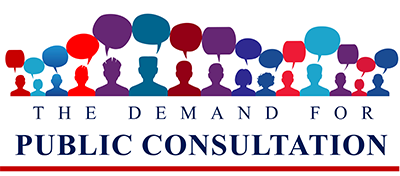
Groundbreaking Study Finds Americans Want Policymakers to Consult the People
Ahead of the 2022 midterms, an in-depth survey finds that large bipartisan majorities of voters favor Members of Congress using new tools for consulting representative samples of their constituents on policy decisions, and to take the recommendations of their constituents – as a whole – into account when voting. More than four-in-ten are even ready to cross party lines to vote for candidates who make this commitment–even when an incumbent of their own party is named.
The survey of 4,309 voters, conducted by the University of Maryland’s Program for Public Consultation, finds widespread dissatisfaction with the current relationship between Members of Congress and the public. Eighty-three percent believe that there is not currently “an adequate system in place for the voice of the American people to be heard in Congress.”
Demand for an alternative approach is strong. Respondents were presented with a hypothetical candidate who commits to a new approach for consulting representative samples of their constituents. A university program working online would select a representative sample of citizens, give them a briefing on current proposals in Congress, have them evaluate competing arguments, reviewed by experts on different sides, and then make their recommendations. The hypothetical candidate committed to take the constituents’ recommendations into account and give them a higher priority than the views of their party leadership.
Substantial bipartisan majorities expressed positive views of such a candidate and readiness to vote for them.
For respondents who have an open seat in an upcoming Congressional race, seven-in-ten said they would likely vote for a candidate who makes this commitment. Most striking, 79% of Democrats said they would likely cross party lines and vote for a Republican who made such a commitment, while 64% of Republicans said they would likely vote for a Democratic candidate who did so.
A separate sample in states with a Senate incumbent likely to run in the upcoming election were also asked how they would respond to such a hypothetical candidate challenging their Senator listed by name. Over six-in-ten said they would likely vote for the challenger. The willingness to cross party lines to vote for a Senate candidate who commits to consulting their constituents is resilient: 44% of Democrats said they would likely vote for a Republican challenger and 41% of Republicans said they would likely vote for a Democratic challenger.
“Americans do not think that the will of the people is reflected in actions of elected officials and it is fueling distrust in government,” commented Steven Kull, director of PPC. “The demand for Congressional representatives who will genuinely consult their constituents can even override partisan loyalties–enough to swing many elections.”
Support for candidates who commit to consulting their constituents is strikingly resilient to attacks. Presented four strongly worded critiques, in all cases less than half (29-48%) found them convincing. All of the rebuttals were found convincing by overwhelming majorities. After evaluating both, the percentage saying that they would likely vote for the candidate committed to public consultation increased by several percentage points.
Contrary to the view that Americans are overwhelmingly partisan, a bipartisan three-in-four said that Members of Congress should be “responsive” to the views of “all their constituents as a whole” (Republicans 73%, Democrats 77%) rather than the views of “the people who voted for them” (26%). Similarly, a large bipartisan majority of 71% said that the majority of the public as a whole is most likely to show the greatest wisdom on questions of what the government should do (Republicans 69%, Democrats 67%), rather than just the majority of Republicans (13%) or Democrats (15%).
An overwhelming bipartisan majority (88%) said that if MoCs were more influenced by “the people” than they are now, they would be more likely to find common ground, (Republicans 92%, Democrats 87%, independents 81%). An analysis of surveys using the public consultation method found that majorities of Republicans and Democrats do agree on 172 positions on issues that have generated Congressional gridlock.
A key question is whether support for consulting the public will be sustained when people encounter majority-supported positions they do not like. In the survey, respondents were presented with some of the public’s 172 bipartisan common ground positions, told these were majority-supported positions and asked whether they agreed with them. Even among those who disagreed with half of the positions they were presented, a majority said they would nonetheless likely vote for a candidate committed to public consultation (56%), and that these positions should have influence on policy decisions in Congress (64%).
The survey was conducted between July 13 – September 15, 2021, and the margin of error was +/-1.5% for questions that were asked to the entire sample. For questions that went to partial samples the margin of error varied from +/- 2.1% to as high as +/-9.2%. All surveys were conducted online with a sample provided by Nielsen Scarborough from its larger probability-based panel recruited by telephone and mail.
- Report: The Demand for Public Consultation
- Survey Questionnaire: https://publicconsultation.org/wp-content/uploads/2022/07/GBP_Quaire_0921.pdf

Be the first to comment